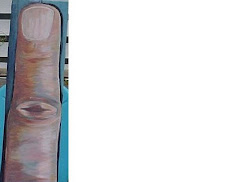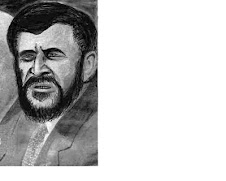 |
| Fallujah |
As the camera remained poised at a distance, all the viewer could see was a small splash of red in the middle of a palette of greens and browns and ocher. The sound of a woman weeping played over the speakers. There in the forest, where, surrounded by the beauty of the tall trees she loved so much and thinking they were her only company, she had surrendered to her grief as waves of sorrow and unbearable anguish forced their way through her usually placid exterior, replaced by a veil of tears as sobs, once given vent, were wrenched from her in fitful gasps of despair that no amount of consolation would ever assuage.
But she wasn't alone.
Detective Chief Inspector Foyle was scouring the woods for a fugitive from justice and had, too late to shade his presence, stumbled into her solitude and she found herself embarrassed and exposed, her sorrow, so openly witnessed, now impossible to be brushed off as easily as the tears from her cheek. So while she struggled to find a means of explaining away her distress, he uttered, in his clipped manner of speaking, these few simple words, "So ... what happened to you?"
She hesitated, but somehow consoled by the simplicity of this question and trusting her instinct that his calm exterior concealed a compassionate heart, she confided the source of her pain. "There was a man ... a romance ... a marriage. There came a boy. A beautiful, lovely boy. His country called him. He went. And it threw him into the war machine that mangled him and spit out his lifeless body in an unrecognizable pulp." And as she screamed out in her anger and utter hopelessness, "This bloody War!", and collapsed into tears again, he stepped forward, stepped out of his usual calm reserve and held her in his arms, as even men know that sometimes there is no comfort words can hope to provide; that the warmth of a human touch is all that can console, to the extent it can be consoled, a grief so profound as a mother's loss of her child.
And then came Orlando.
And as the TV screens around the world showed the horror wreaked by one man's rampage and one bloody body after another was dragged from the carnage, as one correspondent after another evinced shock and disbelief, offering up their trite explanation for a tragedy as it unfolded, everyone was blamed, Radical Islam, the NRA, the FBI, but not once, either then or in in the days that followed, in the endless stream of invective, sorrow and despair did anyone ever utter the cry that was wrenched form the woman in the woods. Not once did it occur to the American public or to even one of the members of the fourth estate to yell,
"This bloody War!"
Because nowhere in America is there any realization that for the last decade and a half the United States has been engaged in a War on Terror. It is merely a phrase, one that should long ago have been exposed for what it is: an excuse to invade, occupy, and plunder distant lands in order to provide the wherewithal for "The American Way of Life" that neither Party, both of which have long since abandoned the polity they supposedly represent, has any intention of amending by even one whit.
And at the center of that Way of Life, energizing it and flowing through its sclerotic arteries, runs a black viscous fluid without which all grinds to a wrenching stop: OIL.
Thirty-five years after The Reagan Revolution started what was going to "Make America Great Again" we have come full circle (perhaps that's why it's called it a revolution) to where, despite the country taking the turn down the road of unsustainable energy usage by remolding the world to turn it into a giant oil spigot that flows into the US even as the country's riches flow in to the coffers of despotic kingdoms ruled with the iron fist of Islamic Wahhabi-schooled sheikhs or to one-Party-ruled Communist states, the insatiable thirst for oil needed to sustain this American Way of life is all but ignored, so that the ramifications underlying the necessity to keep the pistons of industry lubed are invisible to the hordes that flock to the cities where the despoliation is all but invisible, even as its cornucopia of trinkets and electrical-enabled goodies and petroleum-dependent transport Pulse through its sinews.
The upshot of the Reagan Revolution did indeed bring us Mourning in America, but no one wants to make that connection. No one wants to admit that the path we started down when those solar panels were ripped triumphantly from the roof of the White House has had any cost, that our insistence on maintaining our motored-driven mobility, instant gratification and moronic militancy comes at a price.
And that that price is constant War.
War so entrenched and so integral to the American Way of Life that we don't even notice the casualties in its midst, grabbing instead at straws in the winds to blame for the carnage we have wrought, pretending we are just innocent victims of circumstance.
And then Iraqi forces retook Fallujah.
Yet amid the inevitable description of ISIS atrocities, no mention is made of bombs made from depleted, but still radioactive, uranium, or phosphorous bombs, or of cluster bombs, the newest versions of which were recently sold to our "allies" in fossil-fueled madness, Saudi Arabia, to drop on the civilians of Yemen, using our 2004 annihilation of Fallujah as their template.
Because, as Doug Ollivant, a former military planner in Baghdad and senior fellow at the New America Foundation, told The Washington Post, "The message to the Iraqis has been to focus on the short-term problem that this president would like solved by January, but the focus is on the symptom and not the root cause of the problem."
It shouldn't however, be surprising that the state we invaded and destroyed, casually describing it as a mere cakewalk, and then setting up a puppet regime dependent on US largess, should mirror our own faults and shortcomings and exhibit an Oedipal blindness to the causes underlying its manifold problems, as, evidenced by the rhetoric following the massacre in Orlando, there is no country better than the US of A at focusing on the symptom and assiduously ignoring the root cause of its problems.


















































